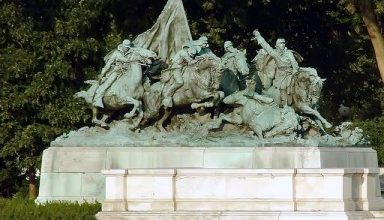Araby by James Joyce is a part of his collection of short stories called Dubliners, published in 1914. Much like the other stories in the collection, Araby depicts middle-class Dublin life in the form of a young, unnamed boy desperately infatuated with his neighbor and playmate Mangan’s sister. However, his disappointment about Araby, the bazaar, brings him to the epiphany that the way he thinks of the girl as exotic, she too will disappoint him, causing him to give up on her. The story captures the boredom associated with middle-class Dublin life and how the desire for new experiences is often thwarted in the face of the same.
Araby | Summary
The story begins as the narrator, an unnamed boy, thinks about North Richmond Street in Dublin, where his family has moved. Before his family moved in, a priest died in the house; he had been a charitable man who had left all his furniture to his sister and money to institutions. He thinks about the games that he and his friends play on the street in the winter. If the narrator’s uncle comes at the end of the street, they hide until he has gone back to the house. His friend Mangan’s sister comes out to the doorstep to call her brother to tea, a moment the narrator greatly looks forward to.
The narrator watches her door, placing himself so that he can watch her leave. He never stops to talk to her and quickens his pace, passing her anytime their paths diverge. Despite the fact that the narrator is deeply infatuated with her; she is always in his thoughts. He thinks about her when he accompanies his aunt to the market and is jostled by drunk men and bargaining women. His eyes were always “full of tears” and he thinks he would never be able to speak to her or tell her of his “confused adoration”.
One day he goes to the room where the priest had died and again thinks about her, whispering ‘O love, O love’ to himself. One morning, the girl asks if he plans to go to Araby, a Dublin bazaar. The narrator is so bewildered that he does not know how to speak in front of her. She notes that she would love to go but has committed to a retreat at her convent when the narrator asks her why she cannot go. The narrator tells her that if he goes, he will bring something for her.
Afterward, the narrator is consumed by the thoughts of the bazaar and the girl. He did not wish to do his schoolwork and thought of her every time he sat to read. He asks his aunt to go to the bazaar on Saturday night, which surprises her. He does not participate actively in class, which makes his master think that he is wasting his time.
He reminds his uncle on Saturday morning that that very evening he planned to go to the bazaar, so he comes home early to give him the train fare. Yet dinner is prolonged by an hour due to a visit by a guest, a garrulous woman named Mrs. Mercer. Still, his uncle has not come home. When he finally comes home at nine, he is unbothered about being late and has forgotten about the bazaar. He apologizes, quoting “All work and no play makes Jack a dull boy”, and asks the narrator where he is going. The narrator tells him for the second time, and the uncle asks him if he knows the poem The Arab’s Farewell to His Steed. When he is about to recite the opening lines of the poem, the narrator leaves and manages to reach the bazaar just before 10 p.m., when all the shops are about to close down.
He approaches one stall that is still open, where a young lady is selling porcelain vases and flowered tea sets. She asks him uninterestedly if he wishes to buy something, and the narrator says no. The young woman goes back to the two men she was talking to. Having purchased nothing for Mangan’s sister, he stands in the bazaar angrily.
Araby | Analysis
The opening of the story suggests that the narrator possibly lives in a heavily religious and sheltered area of Dublin. After attending the Catholic Brothers’ School, the boys play on the streets and hide from the narrator’s uncle, perhaps because he is very strict or prone to anger. Joyce also provides some details about the priest and makes a commentary on the Catholic Church; the narrator, after his family moved in, found books like The Abbot, The Devout Communicant, and The Memoirs of Vidocq, two of which are non-religious. This shows that the priest was perhaps like any other person who took an interest in other subjects. The discovery of the bicycle pump illustrates that the priest perhaps sought pleasure in more secular activities like biking, making him like any other person in society.
Araby introduces readers to the infatuation and “puppy love” that characterize one’s school years; one knows that the narrator is a schoolboy who, living in this deeply religious environment, finds an escape in thinking about Mangan’s sister. One establishes at the very outset of the story that the atmosphere of North Richmond Street is one of sheer mundanity and drudgery. Joyce repeatedly uses brown as a shade to paint the life of drudgery these Dubliners lead; “brown imperturbable faces“, and “brown-clad figure” are some instances to illustrate the same.
However, Mangan’s sister and the bazaar promise alluring experiences that he has never felt. The ‘brown figure’ symbol is not just symbolic of the everyday banalities of the street, but also the exoticism of the Orient. ‘Araby’, the name of the bazaar, also resonates with Arabia, whose romanticized images fill the narrator’s head and cast an “Eastern enchantment” over him. However, the bazaar’s disappointing reality causes great anguish to the narrator; contrary to his ideas of Araby, the bazaar only has familiar accents and English goods to sell. This disappointment is not only the cause of great anger for the narrator but ultimately makes him give up on Mangan’s sister because he realizes that his great love for her is nothing but a vain desire for change; she too, like the promise of the bazaar, would disappoint him by being just as mundane. His feelings for the girl are a desperate attempt at decimating the absolute boredom that characterizes his life; his uncle’s coming home late, the minutes ticking by as he sits through school and church, he fills his mind with the woman to escape these banalities.
Indeed, it is interesting to note that Mangan’s sister also remains unnamed without any particular characteristics or features defining her, just as any other next-door neighbor. The prison of routine reduces him to a “creature driven by vanity” whose ‘love’ is an infatuation to curb the boredom characterizing his life.
Araby | Character Sketch
The Narrator
The Narrator of Araby is a young boy in school who grapples with the conflict of new love, new experiences, and the same, old drudgery. He lives with his aunt and uncle and attends a Catholic school. His experience moves him from an excited youth desperate to feel something new to a disappointed “creature of vanity”. Dublin life, in this sense, appears to be a prison of routine and mundanity that traps the narrator, who is desperate to break free; what could have been a tale of young love ultimately becomes a tragic denouement.
The Narrator’s Uncle
The Narrator’s uncle seems to be an authority figure; the boys are seemingly afraid of him and hide on the street when they see him coming home for dinner. He also seems to owe some money to Mrs. Mercer and is forgetful about things, as he forgets that the narrator had to go to Araby in the evening. He seems to have a drinking problem and avoids giving the narrator money to spend at the bazaar, but he relents eventually.
Mangan’s Sister
Mangan’s sister is the object of the narrator’s infatuation, but there is no indication in the story that she is aware of it. She routinely comes to the doorstep to call her brother to tea, interrupting the boys’ game—a moment the narrator regularly looks forward to. The narrator calls her a brown-clad figure, indicating how she reflects both, the mundanity of the Dublin street and the faraway allure of the East. Ultimately, the narrator gives up on her, realizing that, like Araby, she too will disappoint him by being utterly banal.
The Priest
The priest is mentioned at the beginning of the story because he was the tenant of the house the narrator moved into before he died. The narrator finds three books in his home library that spark his interest, The Abbot, The Devout Communicant, and The Memoirs of Vidocq, of which The Abbot is a romance by Walter Scott and The Memoirs of Vidocq is detective fiction. This is an odd choice of books for a priest, and it reflects that the said priest must have had other interests and indulgences than religion. A bicycle pump hidden under a bush also suggests that he rode a bike in secret. Joyce seems to shed light on the fact that even the priesthood is like any other job that ends at the end of a workday.
Araby | Literary Devices
Simile: Simile is used at multiple instances in the story: “her name was like a summons to all my foolish blood”, “my body was like a harp and her words and gestures were like fingers running upon the wires“, “silence like that which pervades a church after a service“ “great jars that stood like eastern guards“, etc.
Foreshadowing: Foreshadowing is employed when the narrator tells his uncle about his evening plans to go to the bazaar. He says:
“The air was pitilessly raw and already my heart misgave me”.
Joyce creates an atmosphere where the reader is going to join the narrator in his disappointment. Not only did he reach the bazaar late, but he was also utterly disappointed at its banality.
Personification: Joyce employs personification at the beginning of the story to describe the houses when he writes:
The other houses of the street, conscious of decent lives within them, gazed at one another with brown imperturbable faces”.
Situational Irony: Araby culminates with a situational irony as the narrator, who painted exotic and alluring images of the bazaar just as he did of Mangan’s sister, was utterly disappointed as his “Eastern enchantment” was thwarted with mundanity and drudgery.
James Joyce’s Araby from his collection of short stories, Dubliners (1914), chronicles a young boy’s infatuation with his friend’s sister. The story tackles many themes, including the dangers of idealization, the influence of the Catholic Church on the middle class, the meeting of imagination and reality, etc. Much like the other stories in Dubliners, Joyce’s story centers around an epiphany—a life-changing moment or realization of a character—that his fascination with the bazaar and his love for the girl was nothing but desperate attempts at obliterating the banality that characterizes his life, and he tragically gives her up in the end.



